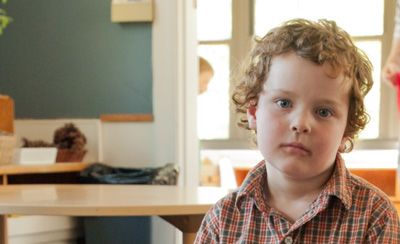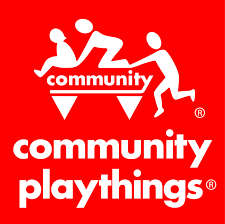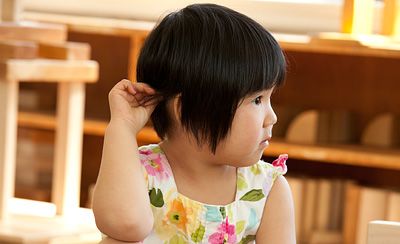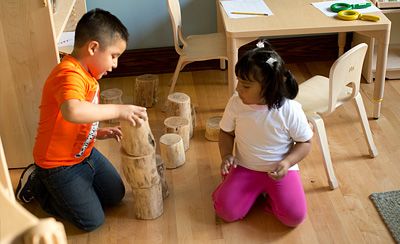Making Time for Boredom
How unstructured downtime allows for the growth of creativity
|
January 2016
“I’m Boring!”
Years ago, in my classroom of 4 year olds, little Stephanie walked up to me amid the hustle and bustle of children engaged around the room and said, “I’m boring.” Besides the obvious misuse of the word and my temptation to laugh, I recognized that Stephanie was asking for help. We talked a bit about what kinds of things she might do. We looked around the room to see what other children were doing. I made suggestions. She shrugged her shoulders.
Young children often misuse words and occasionally their words disguise the true meaning of what they are feeling. Stephanie’s true problem was not about boredom. She didn’t know how to find a friend, to fit into the play and activity of the room. Fortunately, I was able to help Stephanie with that. Once involved with other children, she never complained again about being “boring.”
But for Stephanie and for all children, having moments of boredom is a good thing. It allows children time to simply float along, daydream, or imagine. Boredom is useful in that it compels children to invent, to switch gears, to think of something new, and to learn to enjoy their own company.
Boredom allows children the time to simply float along, daydream, or imagine.
Boredom in our classrooms
However, in fairness, I think we must think carefully about our classroom environment and curriculum. What if the classroom is boring? Children can be busy, but uninterested and disengaged from the activity. There are different types of boredom; we can distinguish between them by observing what children do in their environment.
- Are children engaged in things that are interesting to them?
- Are they mostly deeply involved in their play?
- Do they feel that they belong and are treated kindly?
- Do they have adventures and challenges to pursue?
If they are and do, they may be bored from time to time, but this will not interfere in their pleasure and learning. They may have moments of boredom, but will use that downtime to invent new ways to play.
However,
- If children are forced to participate in activities and “work” that they cannot possibly understand or relate to, they will be bored.
- If they are being asked to sit still and listen more than they are allowed to actively participate, they will be bored.
- If they do not spend long periods of play outdoors, they will be bored.
- If they do not get to move most of the day, they will be bored.
This kind of “bored” is not helpful because it is built into the program, ignores the child’s needs, and leaves the child unable to invent new paths to play and learning. It keeps children busy but not interested and engaged. In other words, (as we all know) you can be busy while being bored silly.

Not all types of boredom are constructive. What if the classroom is boring?
When a parent complains that her child is bored in a classroom, teachers should ask, “What is the parent really saying or feeling?” Take time to consider the context of families lives today, the pressures families experience with the constant barrage of misinformation they receive from the media, and the attitude changes about childhood that have taken place over the years.
Changes in Attitude, Expectations, and Environment of Childhood
It's not clear whether children complain more today than they used to about being bored, but we do know that childhood has changed considerably during the past 30 years. This is not because young children have fundamentally changed, but because of the environment in which they find themselves and the expectations placed on them have changed. Perhaps, today, there is a tendency for adults to believe they must alleviate a child’s boredom, compared to a time when parents did not feel it was their responsibility. A parent of 30 years ago might say, “You’re bored? Figure out something to do!”
Listed below are a few factors that reveal how childhood has changed and influenced our attitude about time and boredom.
- More structured lives. Most young children spend full days in childcare settings and after school programs and then find themselves in structured activities during the weekends. These children simply do not have any practice in boredom and, therefore, do not know what to do when it occurs.
- Play. Adults once assumed that play was the work and natural occupation of children. By definition, play means that children are engaged in self-initiated activities, alone or with other children. For young children, play encompasses fantasy, use of their senses, being active, and using their bodies to understand the world around them. Children who play often become master players and do not need much outside guidance. When bored, children invent things to do because they regulate the play. Has that changed?
- Entertainment. There seems to be a sense that children must be entertained to keep them from being bored. This might explain the highly orchestrated children’s parties, and the many structured, adult-led activities and sports in which young children are now participating. Children are rarely left to their own devices and time is scheduled rather than experienced.
- Technology. Technology offers children a constant array of stimulating virtual activities for which there is no need for a pause or interruption, a friend, or an idea to blossom. There is no opportunity to be bored in a “good” way.
- Anxiety. Parents express anxiety about their children not making the grade in school and in life. They worry about their child’s future and believe that play or “doing nothing” is a waste of precious time and instead choose time spent on skill building or academic programs that keep their child occupied.
When left to their own devices, children will naturally invent things to do when they are bored.
Making room for creativity
I once had a parent tell me that she was concerned that our preschool program would not be stimulating enough for her child. She wanted to see worksheets, step-by-step crafts, memorization, and—I kid you not—homework. I explained it was very possible that our program was not what she was looking for but that, in my experience, the really bright kids (and as far as I’m concerned, all kids are bright kids), are completely bored by doing worksheets, memorizing letters, waiting in line, or reciting teacher-directed words. In fact, those activities require very little intellectual rigor and discourage creative thinking. I invited the parent to look around the classroom at the children’s faces and to look at what they were doing. I stood with her as we watched children intensely involved in conversations, inquiry, problem solving, laughter, kindness, and intellectual pursuits through various kinds of play experiences. Did a child seem bored on occasion? Probably. But the children and the teachers were okay with that. Good things come from that occasional boredom and we trusted that children knew how to make those good things happen.
In those days, our school owned a filmstrip that we would show to the children a few times each year. It was called, “Nothing is Something To Do”. I wish I still had a copy. Better yet, I wish we, adults and children, could adopt that attitude as we enter a new year. We all need a little time to listen to our own thoughts and to simply “be” with our boredom and recognize that nothing is something to do.









